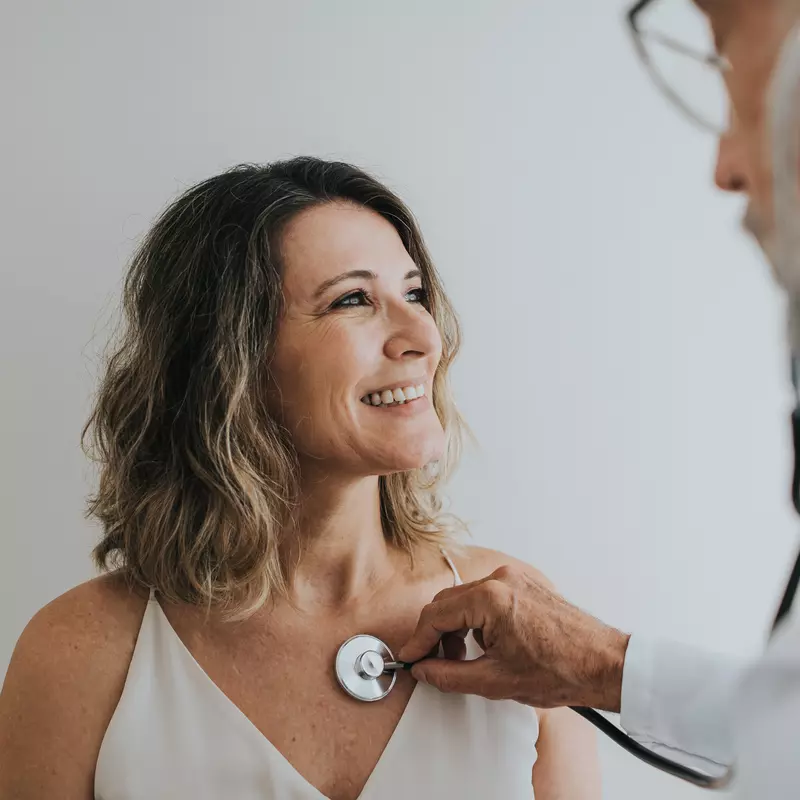
Expert Stroke Treatment When You Need It
Having a stroke is frightening and can leave you feeling uncertain about your health and well-being. But you can lean on the stroke specialists at UChicago Medicine AdventHealth for immediate treatment in our ERs and follow-up care that sets you on a path to recovery.
Our expert teams are well-equipped to respond to signs of a stroke with speed, efficiency and a high level of whole-person care. Our multidisciplinary team includes acute stroke specialists, neurologists, neurointerventional radiologists, neuroimaging specialists, neurosurgeons and rehabilitation therapists. We’ll be there for you before, during and after your stroke, caring for you with compassion and expertise.
We’re here to help you find the right neurologist or a location that’s convenient for you.
Trusted Expertise in Identifying and Treating Strokes
- What Is a Stroke?
-
A stroke — also called a cerebrovascular accident (CVA) — occurs when a blood vessel leading to the brain becomes blocked, cutting off the brain’s supply of oxygen and nutrients.
Most importantly, a stroke is a medical emergency. Call 911 right away if you suspect a stroke in yourself or a loved one.
There are two main types of strokes. An ischemic stroke is the most common and happens when an artery in the neck or brain becomes blocked, often from a blood clot. This blockage prevents blood and oxygen from flowing to the brain, resulting in brain cell death. Hemorrhagic stroke occurs when a blood vessel in the brain breaks, bleeding into the brain tissue. This also leads to the death of brain cells.
A transient ischemic stroke, also called a “mini-stroke,” is a short episode of stroke symptoms that doesn’t cause permanent damage but can lead to a serious stroke in the future.
- Get To Know Stroke Signs and Symptoms
-
When you understand stroke symptoms, you can be better prepared and empowered to recognize them and call 911 right away. When a stroke happens, time is critical. If you suspect a stroke, call 911. Don’t wait, and don’t drive yourself to the ER. Seek medical attention immediately, even if the symptoms appear to go away.
A stroke can include the sudden onset of several symptoms, including:
- Loss of balance or coordination, difficulty walking and dizziness
- Difficulty seeing, double vision or loss of vision
- Numbness or weakness in the face, arms or legs (particularly on one side of the body)
- Difficulty speaking or understanding language
- Severe headache with no known cause (sometimes called a “thunderclap” headache)
- Stroke Risk Factors To Know
-
Response time is key when it comes to strokes. You need an experienced and highly coordinated team of experts who can act quickly and decisively to deliver your care.
Our UChicago Medicine AdventHealth stroke team is trained to evaluate for stroke symptoms quickly and treat the stroke rapidly with a clot-busting medication called a tissue plasminogen activator (tPA). We also offer a lifesaving procedure called a mechanical thrombectomy that can treat a severe stroke.
Your stroke treatment plan may also include:
- Blood thinners
- Carotid artery angioplasty
- Minimally invasive endovascular procedure
- Neuroendovascular surgery (NES) for a more minimally invasive procedure
- Surgical blood clot removal or clipping
- Award-Winning Care for Better Results
-
The Joint Commission designated our UChicago Medicine AdventHealth hospitals in Bolingbrook, Hinsdale and La Grange as Advanced Primary Stroke Centers. UChicago Medicine AdventHealth GlenOaks is recognized as a Primary Stroke Center.
Our hospitals in Bolingbrook, Hinsdale, and La Grange are also honored to have earned the Stroke Gold Plus Target Honor Roll Elite Plus award, which is the highest award offered by the American Heart Association and the American Stroke Association.
- Stroke Recovery
-
Recovering from a stroke requires a strong support system. Our healthcare teams take a multidisciplinary, whole-person approach. We’ll work with you at every step of your journey: prevention, diagnosis, treatment and rehabilitation.
If you smoke, have heart disease or a family history of strokes, we’ll be proactive, performing regular screenings and putting you on a path of prevention. This might include medications, guidance and positive lifestyle changes.
After we treat the immediate stroke, our neurology and rehabilitation professionals will work together to help you rediscover your strength. We partner with Shirley Ryan AbilityLab to offer world-class physical, occupational and speech therapy to guide you toward healing.

Stroke Treatment to Get You Back to Life
When it comes to stroke prevention, treatment and recovery, you’ve got this because you’ve got us. Get the expert care and support you need for your neurological health.
A Network of Neurological Care in Chicagoland
Your brain and body are a connected system, and so are we. With a multidisciplinary approach to care, we reach across specialties to give you the support you need to thrive. You can count on us to listen to you, respect your time, compare notes and make treatment decisions that meet your needs and goals. No matter what’s on your chart or your mind, we’re here for you at every step.